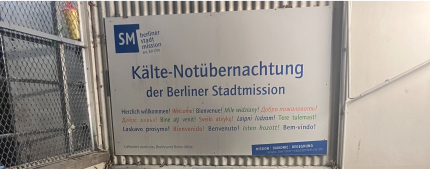A Notübernachtung

Eight months ago, I moved to Berlin, Germany. I was given the opportunity to work in a Notübernachtung—an emergency overnight shelter for people experiencing homelessness.
Working here has given me a visceral understanding of the struggles faced by people experiencing homelessness and allowed me to develop meaningful relationships with many of them. A man once told me, “I wish people would look at me; that they would acknowledge my existence.” There is another woman who tells me, “I’m a little crazy,” and whenever she gets a new teddy bear, she proudly shows it to me and tells me its name. Another woman smiles as she empties her pockets to reveal pinecones, showing them off as if they were her greatest treasures.
Coming to Berlin, I wasn’t sure what missions would look like here, but after working at the shelter, I’ve come to believe that missions work, at its core, requires meeting people where they are. At the shelter, we are aware that we are merely providing the people we work with the basic necessities for survival. We are not helping them access permanent housing; instead, we provide them with a warm and safe place to stay during the winter months, helping them escape the bitterly cold streets. In interacting with the shelter’s guests, I hope they feel treated with dignity. To me, that is the shelter’s mission: to recognize the humanity of the people society often overlooks. To treat people with dignity and respect, to listen to them, treat them with care, and give them a voice, and in doing so, show them God’s love.
The experience has humanized the people we walk by on the street and often don't give a second thought to.
The shelter itself has its own unique culture. Although most of the workers are German, only one-third of the guests are, with the majority coming from other Eastern European countries. As a dual Canadian American citizen, I contribute further to the diversity of the shelter. The most challenging aspect arising from the shelter’s unique cultural microcosm is the language barrier. Many of our guests are unable to speak German, which forces us to communicate through pointing, gestures, and occasionally, the use of Google Translate. Being unable to understand someone or be understood can be exhausting.
Once a week, my housemates volunteer at the shelter where I work. Many of my housemates have expressed their gratitude for working there, as it has deepened their empathy for people experiencing homelessness. The experience has humanized the people we walk by on the street and often don't give a second thought to.
One evening, I worked with my suitemate at the Notübernachtung. She helped create the Medical List, where she facilitates visits to the doctor for people who had requested medical aid. As she speaks Russian, she can translate the health problems of the Russian-speaking patient population who come to the doctor. When we came home one night, she expressed her sadness at seeing so many people in pain.
Someone asked me the other day, “Do you feel like the people you work with bring value to society?”
There was one man who could not get the surgery he needed because he lacked the proper paperwork. He was in an incredible amount of pain and could not obtain strong enough pain medication. He cried as he told her about the amount of pain he was in and the struggle he had trying to get the medical help he needed. Seeing him in so much pain, she stated, "I cried with him."
Someone asked me the other day, “Do you feel like the people you work with bring value to society?” I responded to them, “I think they have brought value to my life, and I think that’s enough.” I suppose the value of a human life is something I will never question, as I believe we are created in the image of God and that therefore every person has intrinsic dignity and worth. I hope that our work in the shelter reflects the inherent worth of each human being.
Let me leave you with this: I hope you choose to fight for those in our society who are often overlooked. When you encounter someone who is in pain, battling addiction, or perhaps simply looks a little rough on the outside, I hope you remember that they are worthy of love. God loves each of us regardless of what we have done, what we struggle with, or even how hygienic we are. If every person deserves to be treated with dignity and love, then who will do this, if not us?
Don't miss a blog in our (International) Mission Postures series. Read and subscribe for each piece in the series.
Photo provided by the author.




